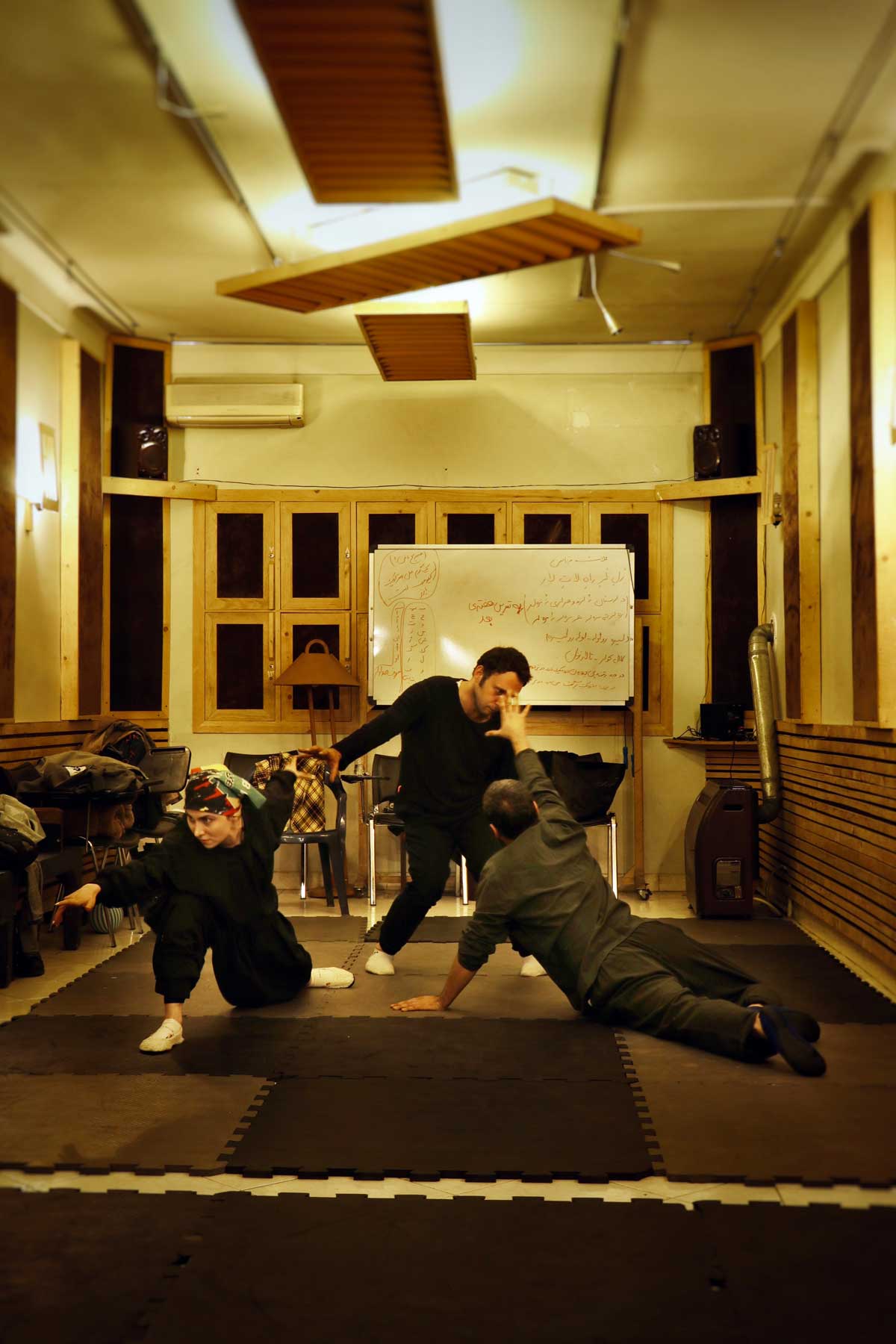Beyond the university classroom
Report on the first course of Focused theater workshops of MaktabeTehran[1]
Although Jalal Tehrani has been absent from the theater for seven years now, in all this time, the author and director of the plays Hey Big Man, Don't Cry, Single Cells, Nefertiti and The Tank are far from performing arts. Has not been. In addition to writing several plays and screenplays, he has launched the publishing house MaktabeTehran and now he has established not only the publishing house but also the cultural-artistic institution MaktabeTehran. An institution that, in addition to publications that focus more on art, research, or children's books, is supposed to carry out educational activities, such as holding scientific conferences, holding educational workshops, or even holding art festivals, etc. And now this fledgling institution introduces itself by organizing the first conference of Concentrated Theater Workshops. This conference is a tricky market for itself, it has 16 topics with several different trainers of all ages and spectrums. How to see, Sound hygiene, View angle ratio with narrative, Word relationship with emotions, state and movement, Logical transition from reality, Technical methods of reading the play, and... Even a cursory look at the schedule of workshops shows the attention to detail in the selection of topics. Of course, the instructors themselves have chosen the topics of their workshops. Among these instructors, the names of more experienced artists such as Farhad Mohandespour, Hamid Pourazri, Mohammad Rezairad, Hossein Kayani can be seen, as well as younger names such as Ali Asghar Dashti or Payam Dehkordi, and even younger generations such as Ehsan Falahatpishe or Amir Ghanbari, Mohammad Sadegh Maleki, etc.

A side of structural learning
It doesn't matter what field you studied or which university you graduated from. Many times you have heard this repeated sentence and said, "University didn't teach us much. It was like a basic and general acquaintance..." The children of "MaktabeTehran" also know this. They have tried to choose specific topics for their conference and in this way fill some gaps in university education. But what is the purpose of holding this conference? This is a question that, naturally, Jalal Tehrani, as the director of the institute and the person under whose supervision the workshops are held, can answer it better than others: "Most of the teachings of our theater happen in practice, so the best way to progress in theater is practice and performance work. Considering that in Iran, there are no practical and training facilities for the number of applicants, students and theater artists, the existence of these workshops is necessary so that the children can perform the exercises that are necessary for progress in theater under the pretext of attending such workshops. But this is not the only goal of this conference: "Another goal is to move our theater space from generalizations, lectures and ideological theorizing to learning the structure and techniques of theater. In fact, we, who claim to be coaches, limit ourselves to talking about theatrical skills and not about our own insights and worldviews towards theater. These conferences are supposed to continue. This is the emphasis of the institute. Of course, Tehrani also mentions that: "We will hold the first conference, which will definitely have weaknesses, with a more general approach to the issues, but in the continuation of these conferences, we will advance the issues with a more calculated classification. This means that in the continuation of these conferences, we offer a general platform and the trainers and professors themselves will define the desired workshops. We are interested in holding these conferences for a maximum of 10 days per month, but because this is the first period and also because it coincides with the month of Ramadan, our schedule has been stretched a bit. This means that some workshops will last longer than the desired 10 days, although the number of these workshops is not many. The composition of coaches is another interesting point in this conference. In this regard, Jalal Tehrani also says: "Given that our emphasis is on structural issues, first of all, our criteria for the qualification of people is their technical capabilities and technical skills. "Obviously, professors who have more experience have more skills, but because our workshops are very detailed, younger professors can also organize more compact workshops that they master."
A previous background is required
Mohammad Rezaeirad is one of the professors who is present in this conference with the workshop Dialogue-Performance Position-Rhythm. Like other professors, he chose the subject of the workshop himself and says about this choice: "We use these words a lot in our theater, but we don't have a proper definition of it. In order for our workshop to come out of mere theater and have a practical aspect, the students will also write some material in these few hours."
Rezaeirad himself is well aware of this point that: "These will also be general introductions, because it is not possible to teach subjects such as rhythm and the difference between dialogue and conversation in a session of several hours, but still, because I felt that these subjects are needed by us. I thought it would be good to provide a platform for the children to get to know each other. The author of the plays Such a Dance, Return to the Prime Minister, Report of a Dream, Day of the Jackal, who recently showed his experience in other spaces by holding the program 30 Artists, 30 Performances, 30 Days at the East Gallery. Henry is interested, he doesn't know how many students his workshop will be held, but he strongly emphasizes that: "Participants in this workshop must have a previous background in theater, especially dramatic literature. Although, it is not possible to predict the academic and practical level of students in advance.
Generalization will lead nowhere
Ali Asghar Dashti is another artist who is present at the first conference. He is known more as a novice and experimental director, and organizes the workshop Mise-en-scène as Action or Thought". A topic that is one of the sub-fields of directing, and Dashti tries to familiarize the participants with this topic in a practical way: "We try to make students understand and experience the field of mise-en-scène in a practical way." He organizes his workshop for young artists who have experience in the field of directing, even if these experiences are very little or even beyond the initial experiences of students. But in any case, it is necessary to have half-time experience to attend this workshop. This theater director, who has plays such as Melan Nasruddin, Pinocchio, Don Quixote or The Little Prince in his work record, like his colleagues, believes that generalization in our theater education will not lead us anywhere. Dashti also agrees with the detail-oriented approach of these workshops: "In our trainings, we have a kind of generalist that does not help, but makes everyone fall into a kind of generalist that is not very helpful, while every field has subtleties that require different experiences." The characteristic of these workshops is that they have a more detailed look at the topics." Like Rezaeirad, Dashti believes: "Participants in these workshops should have a basic knowledge of this topic, because it is with these experiences that this workshop will be more useful to them."
No one becomes a playwright by theory
Among all the names and titles, Hossein Kiyani organizes one of the longest workshops of this conference by holding the workshop From Idea to Paint, From Paint to Play and From Play to Performance, each of which is held for 10 hours. He organizes this workshop with the goal that each of the participants will write a complete play at the last stage. He says about the number of sessions of his workshop: "My workshop is about playwriting; It is not a topic that can be concluded in a small number of meetings. I tried to consider the number of hours that we go through the stages of formation of a complete play. In this way, students are involved for two or three months and at the end they write a complete text." Although he is the author and director of Mazhake shonna mule, Takiyeh Mellat, Sasayeh Agha etc., the students with previous background in playwriting help the work to go better, but more than the background, talent and interest are the main condition: "Of course, if the kids have a previous background, we don't have to start all over, and we can skip the basics."
Neda Tayibi
[1] Sharq newspaper, 2010


